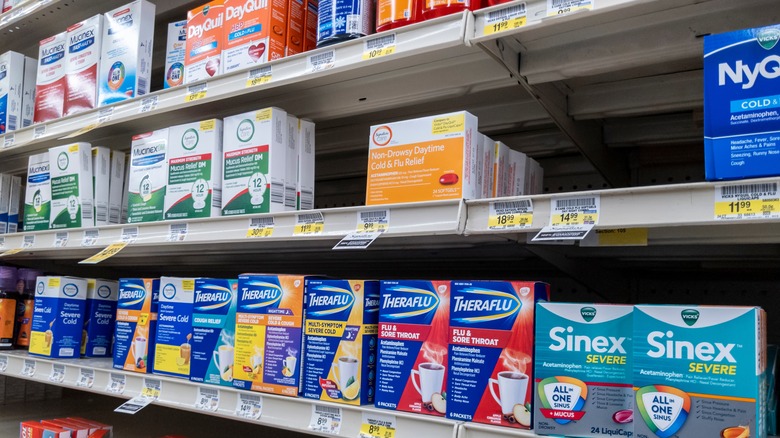NyQuil Or Mucinex? Which Congestion Medication Do People Typically Reach For?
Nothing can encourage you to stop and appreciate the subconscious act of breathing quite like a stuffy nose. When a head cold hits, even the most simple tasks can feel like daunting endeavors. That's because our bodies kick it into overdrive — expending extra energy — as they try to fight off whatever pesky germs are wreaking havoc on our nasal passages (per Boise ENT). Even sleeping becomes more complicated when we're congested. According to a 2002 study published in the American Journal of Respiratory Medicine, obstructed nasal passages lead to disrupted sleep. No wonder getting out of bed feels so hard!
As much as we wish we could keep our stopped-up heads in bed all day, life goes on — and that's where decongestants come in. When we become congested, the blood vessels in our nasal passages swell as a result of inflammation. Nasal decongestants get to work constricting those bloated blood vessels, allowing more room for air to pass through (per National Health Service).
Like most things in life, all decongestants are not created equal, and everybody's got their go-to brand when they need to give their stuffy snoot the boot. Health Digest conducted a survey asking respondents which decongestant they were likely to reach for in their time of need, and here's what we learned.
NyQuil or Mucinex? That is the question
NyQuil took the top spot with 36.8% of the vote. More all-encompassing than the other over-the-counter decongestants on our list, NyQuil has three active ingredients: acetaminophen, dextromethorphan, and doxylamine (per Healthline). Acetaminophen alleviates pain and fever and dextromethorphan suppresses cough, while doxylamine is the antihistamine that works on relieving stuffy nose and sneezing. However, the latter is also what sends you right back to bed for a good 8 hours. Mucinex, on the other hand — our voters' second favorite decongestant with 28.4% of the vote — has guaifenesin listed as their active ingredient. Guaifenesin is an expectorant, which thins out mucus so it's easier to blow or cough out.
19.1% of respondents said Sudafed is their decongestant of choice. More of a classic nasal decongestant, Sudafed can bring you temporary relief from your stuffy nose but don't expect it to help with expectorating (per SingleCare). Robitussin — another expectorant and cough suppressant — garnered 12.8% of the vote. Sinex, which uses oxymetazoline HCl to soothe stuffy nose and sinus pressure, received just 2.9% of the votes (per Vicks).


